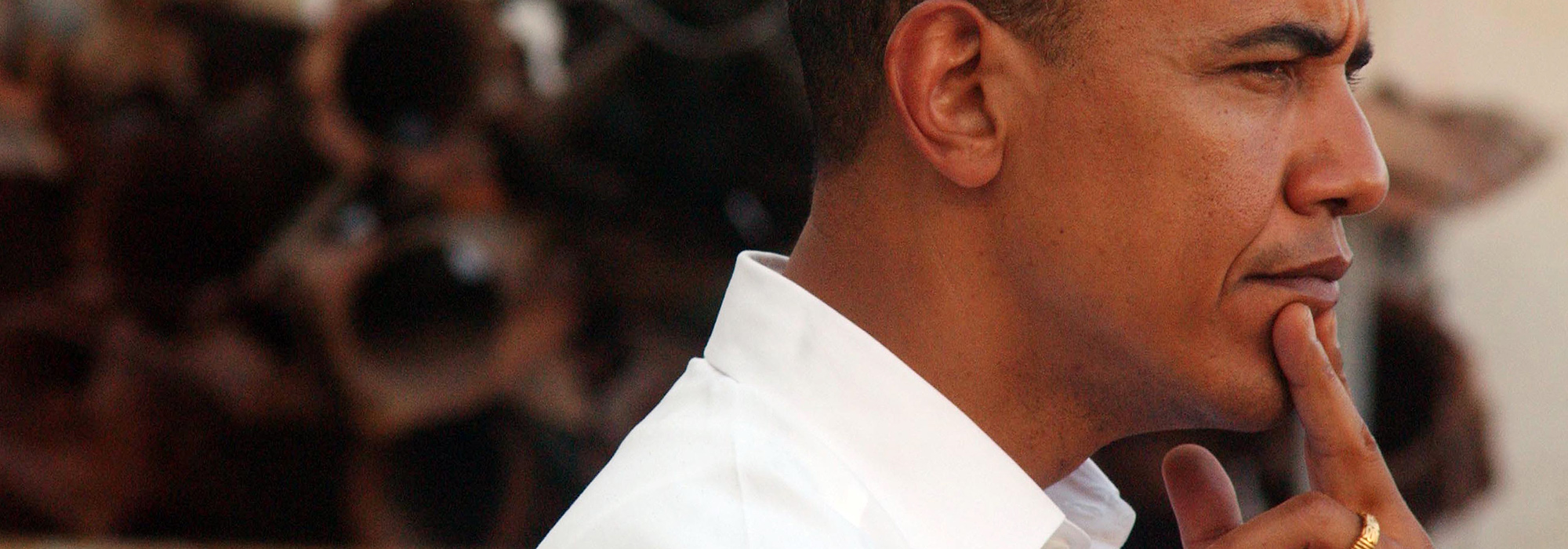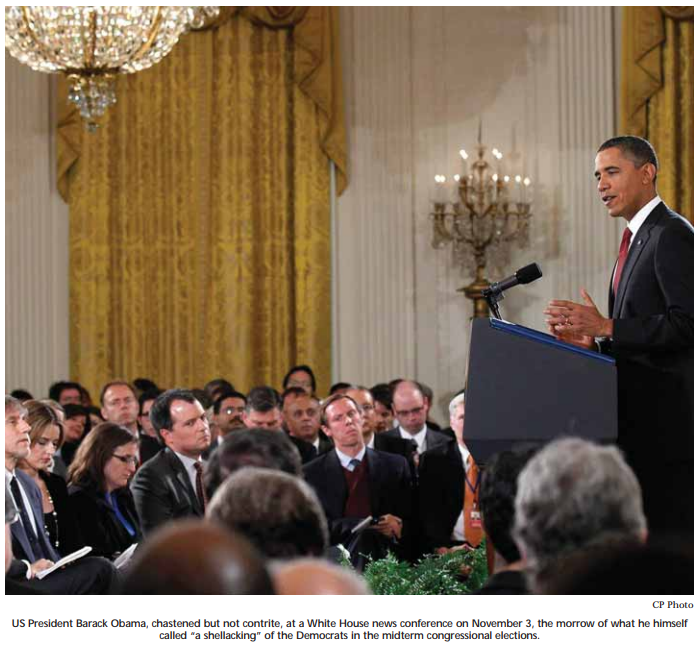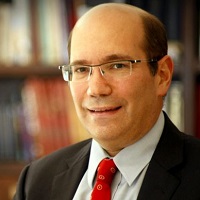
Warning: ignore those headlines that called the American elections a split decision, claiming the Republicans fell short, by winning only the House of Representatives and not the Senate. The American voters gave President Barack Obama and the Democratic Party a good, old-fashioned political whupping during the 2010 midterm Congressional elections. Supporters of Barack Obama, the magical messianist of 2008, were reduced to celebrating that at least they did not lose the Senate, and that the majority leader, Harry Reid, barely kept his seat. This reflected a tremendous comedown as “the One” became the rejected one, as Mr. Yes We Can became Mr. Why Can’t They Understand and Appreciate Me?
The spinning headlines reflect the media hall of mirrors that distorts so much political discussion today. The news that the Republicans would recapture the House of Representatives was pre-reported for so long that its shock power diminished, feeding expectations of a Democratic debacle. By election night, Democrats were relieved they had averted a worse bloodbath, reflecting how low their party fortunes had sunk, and just how many of them were in denial of their massive collective political failure.
But the people spoke loud and clear. President Barack Obama must learn his lesson from what even he, the Denier-in-Chief, admitted was a political “shellacking.” To redeem his presidency, he must do what he originally promised to do, lead from the centre humbly and substantively, culturally and creatively.
Republicans had such a good night that even their losses were gains for them. Having Christine O’Donnell (“I am not a witch”), the wrestling queen Linda McMahon and the gaffe-prone Sharron Angle all lose their Senate bids saved Republicans — and the Tea Party insurgency — from much mainstream media ridicule. The voters helped this still-undefined movement clean out the clowns. Americans don’t want, as their representatives, people who seem empty or crazy. As Ronald Reagan’s former speechwriter Peggy Noonan warned in the Wall Street Journal: “They’ll vote no on that. It’s not just the message, it’s the messenger.”
Having a serious, good-looking, patriotic new Florida senator, Marco Rubio, as the Tea Party poster child makes this movement a more powerful force on the national scene. The other leading Tea Party senator, Rand Paul from Kentucky, is a bookish ideologue who avoided media ridicule after initially stumbling with a Civil Rights-related gaffe. “We’ve come to take our government back,” he thundered on election night. “Tonight, there’s a Tea Party tidal wave.” At the same time, O’Donnell’s initial primary victory over a popular, moderate Republican Mike Castle, who probably would have won the Senate seat in Delaware, demonstrates the Tea Party’s powerful hold over the Republicans’ future.
Blessed by Florida’s time zone, Rubio was one of the first big winners of election night. He took full advantage of his prime-time exposure, giving a moving speech that changed the Tea Party’s public face. Making his story as the son of Cuban exiles America’s story, he called the United States of America simply the single greatest nation in all of human history, a place without equal in the history of all mankind. But, he added, “we also know that something doesn’t seem right.” Delighting in his 20-point victory in a state that has often been famously deadlocked between Republicans and Democrats, the red and the blue, Rubio vowed to go to Washington, DC, and “stand up to this agenda that is taking us in the wrong direction.”
The people spoke loud and clear. President Barack Obama must learn his lesson from what even he, the Denier-in-Chief, admitted was a political “shellacking.” To redeem his presidency, he must do what he originally promised to do, lead from the centre humbly and substantively, culturally and creatively.
The speech was not quite as electric as Ronald Reagan’s televised 1964 fundraising appeal for Barry Goldwater still known today as “The Speech,” or Barack Obama’s 2004 Democratic Convention star-turn. Rubio is more subdued than either of those citizen politicians who ended up in the White House. But its unvarnished red, white and blue nationalism offered a platform of hope during sobering times. It laid the groundwork for the future House Speaker John Boehner’s getting choked up, as he celebrated his life story as a fulfillment of “the American dream.” Rubio’s win helped change the narrative about the Tea Party, or more accurately the Tea Parties, as a series of populist, grassroots expressions of frustration with the Obama agenda.
Throughout campaign season it was difficult to get a handle on the Tea Party phenomenon because of the partisan media filters. Fox News treated Tea Partiers like the Sons — and Daughters — of Liberty while the New York Times treated them like a dark army of buffoonish Sarah Palins and goonish Joe McCarthys subverting American democracy. But election night changed the storyline. The New York Times house conservative, David Brooks, linked the movement that propelled Obama into the White House with the movement that helped purge more than 60 Democrats from the House of Representatives. “Over the past few years, we have seen millions of people mobilize, some behind President Obama and others around the Tea Parties,” Brooks wrote in mid-November. “The country is restive and looking for alternatives. And before the next round of voting begins, I suspect we will see another mass movement: a movement of people who don’t feel represented by either of the partisan orthodoxies; a movement of people who want to fundamentally change the norms, institutions and rigidities that cause our gridlock and threaten our country.”
The rise of the Tea Party, the loss of many moderate Democrats in swing districts and the return to Congress of Reid, Nancy Pelosi and many of their most liberal colleagues led some politicos to conclude that Americans are becoming more polarized and do not want centrist leadership. This conclusion reinforces the Fox News-MSNBC view of the world as fundamentally divided between good people — those who agree with me — and bad partisans — everybody else. Instead, the results reflect American structural anomalies, where moderates come from divided districts and extremists come from strongly partisan districts. During electoral tidal waves, the crucial swing voters veer left or right, wiping out the moderates and leaving the extremists enjoying their grip on power.
Yet considering that the end of the 2010 midterms marks the start of the 2012 presidential campaign, Barack Obama should worry about the massive abandonment of independent voters. It is now clear that Obama erred by fighting for health care reform before lowering the unemployment rate. Obama also erred by passing the governing steering wheel to Speaker Nancy Pelosi and her Congressional Democratic party barons, rather than keeping the more centrist White House as the central political driver. “Usually, a political party loses when it has failed to do its job,” Time magazine’s Joe Klein observed. “These Democrats lost because they succeeded in doing what they’ve been promising for decades.”
And it is now clear that having the health care reform pass by such a partisan, polarizing vote undermined Obama’s entire presidential leadership project. The twentieth century’s two greatest pieces of social legislation, the 1935 Social Security Act and the 1964 Civil Rights Act, passed, after hard fights, with bipartisan support. That the twenty-first century’s first great piece of social legislation passed without Republican support is a very ominous sign.
While coping with an energized opposition taking over the House of Representatives, and diminished Senate numbers, Barack Obama must adjust to changes in the executive branch too. His chief of staff Rahm Emanuel, his National Security Adviser Jim Jones, and one of his leading economic advisers Larry Summers will not be around to roll out Obama 2.0. These and other staff changes will free Obama to resurrect one of the most powerful messages and most successful tactics that emerged during his meteoric rise to the presidency, his call for a new, reasoned centrism.
Yet, while acknowledging his shellacking, Barack Obama seemed remarkably resistant to learning the lesson of 2010. In the buildup to election day, as he stepped up his campaign, he trotted out different excuses for the coming debacle. In a New York Times Magazine interview he used the tired excuse that he and his staff had spent too much time working on policy and not enough time working on politics. Democrats have long relied on this excuse when they have failed to connect with the people, blaming style, not substance. This kind of self-righteous posturing is starting to feed an anti-Barack backlash.
Next, echoing his infamous (but in those days rare) gaffe from the 2008 campaign describing social conservatives and gun owners as bitter, Obama offended many by suggesting that fear and frustration drive voters. Leaders need to lead. Losing leaders need to take stock and not fingerpoint, blaming the people for not having the judgment to follow.
Obama’s obfuscations play into one of the great fears about him personally. Having risen so quickly, having been such a golden boy at Harvard Law, in the US Senate, during the 2008 campaign, can he learn from his mistakes? Increasingly, even Democrats criticized his know-it-all vibe and his apparent lack of empathy.
Obama’s descent can be charted by following how he has been caricatured. When Obama was first elected, his nearly flawless campaign, the euphoria his election triggered and his racial identity intimidated cartoonists and comedians. The Pulitzer Prize-winning cartoonist Mike Luckovich admitted that they simply did not know how to draw him and what to mock about him. Underlying the question, especially for cartoonists, was a racial sensitivity, fearing the many anti-black stereotypes that hover in the American political atmosphere, like germs in the recycled air of an airplane, ready to strike the vulnerable at any moment.
It is now clear that having the health care reform pass by such a partisan, polarizing vote undermined Obama’s entire presidential leadership project. The twentieth century’s two greatest pieces of social legislation, the 1935 Social Security Act and the 1964 Civil Rights Act, passed, after hard fights, with bipartisan support. That the twenty-first century’s first great piece of social legislation passed without Republican support is a very ominous sign.
On Day One, Luckovich found the safe stereotype of using Obama as Mr. Spock. The Inauguration Day cartoon showed a Spock-like president sitting at his desk, getting ready to fix the Constitution. Part of the appeal of the Spock image was that the cartoonist exaggerated Obama’s ears, staying away, to be candid, from the nose and lips, which have been the traditional targets for racist caricature.
Whereas in January 2009 the Spock-like image telegraphed a superhuman sense of competence, calm and logic, today that same image telegraphs a sense of cluelessness and arrogance. One cartoon has Obama as Spock, holding the globe in his hand, saying “Nowhere am I so desperately needed as among a shipload of illogical humans.” A second image ricocheting around the Internet has a Photoshopped Obama with Spock ears and a Star Trek uniform thinking, “I wish Jim would get back. I have no idea how to run this ship.” Uhura is rolling her eyes.
Given America’s depressing history of racism, there is something cosmically fabulous about having America’s first African-American president accused of elitism. But there is something sobering about a leader running a country with 9.6 percent unemployment unable to convey empathy or solve the problem. By the end of his “Don’t Blame Me” pre-election tour, Obama was not even able to fill an arena in Cleveland, an ominous sign and steep fall from the hope-and-change “yes we can” man of 2008. Hendrik Hertzberg lamented in the New Yorker: “In 2008, his calm was a synergistic counterpoint to the joyous excitement of the throngs that packed his rallies. In the tidy quiet isolation of the White House, his serene rationality has felt to many like detachment, even indifference.”
Obama did not just promise hope and change, he promised a new kind of politics. In his book Audacity of Hope, Obama positioned himself as a postpartisan centrist who would resist Washington’s ways. Central to his appeal was his lyrical, multicultural nationalism, exemplified by his eloquent denunciation of the red-state-blue-state paradigm when he gave that extraordinary keynote speech at the 2004 Democratic national convention. Americans did not just hire Obama to be president, they hired him to be that kind of a president, one who would reach out across the aisle, who would sing a song of national unity and purpose that was substantive, pragmatic, results-oriented, not just lofty and lovely.
Unfortunately, as president, Obama has stilled his own voice and failed to reconcile with Republicans. True, Republicans share responsibility for being truculent and obstructionist. But true centrism requires finding that golden path, that middle ground. Instead of delegating the highly partisan Congress to craft the health care reform, instead of negotiating so desperately to forge his Democratic coalition, Obama needed to deliver bipartisan support for such a monumental shift in America’s status quo. The social security and civil rights bills quickly became part of the national consensus, thanks to the consensus-building presidential leadership that ensured bipartisan passage. By contrast, abortion has festered as an issue for decades because the Supreme Court legalized women’s right to choose, circumventing any kind of populist, consensus building.
Obama showed great potential as a cultural leader in 2008; perhaps it is time for him to take the lead in fighting the gong-show governance emanating from cable TV coverage of American politics. Watching MSNBC on election night, watching Keith Olbermann and company shout away at Congressman Eric Cantor, who enjoyed giving back as good as he got, I was struck by the violent distortions of the cable echo chamber. Politicians who spend their time appearing on these shows forget that only a small percentage of Americans are watching. The pols begin to think that everyone wants to shout about politics. What if politicians stopped appearing on shout-TV?
Back in 2004, when comedian Jon Stewart appeared on CNN’s polarizing show Crossfire, he confronted its hosts, begging: “Stop, stop, stop, stop hurting America.” Why is it that we needed a comedian to confront the Crossfire crowd and no politician had the guts to reject this and other formats that foster fighting, that reward unreason? Franklin Roosevelt said the presidency is preeminently a place of moral leadership. Obama should take the lead with substantive moves to cut down the culture of confrontation.
In this time of great national and international stress, Obama has to find the right tone to strike. This may have been the successful Tea Party candidates’ greatest success. Taking a page from the Ronald Reagan playbook, Rubio, Paul and others were able to channel American anger into electoral action by tapping into traditional American pride and grand national ambition. In 2008, Senator Obama found the right alchemy in fighting against President George W. Bush, advocating a return to national idealism. As president, Obama seems too cowed by the scale of the problems, and, by now, the fact that he is perceived to be responsible for them. As a result, his attempts to appear optimistic increasingly appear delusional.
In fairness, Americans are in a particularly nasty mood. After the election, when the bipartisan commission chaired by the Democrat Erskine Bowles and the Republican Alan Simpson offered suggestions to cut the budget, critics immediately questioned their motives and mocked them rather than engaging their ideas. Paul Krugman in the New York Times claimed that the bipartisan commission had been hijacked on behalf of an ideological agenda, namely the same old, same old tax cuts for the rich. “Doesn’t Bowles-Simpson sound a lot like a medical procedure?” Krugman’s colleague Gail Collins chimed in, mimicking Maureen Dowd’s mission to substitute punch lines for political analysis. “Or a really high-end vacuum cleaner?”
All this cynicism and nastiness takes its toll. Commenting on the by now ritual wave of negative advertisements during the election, Peggy Noonan summarized the last three decades of increasingly harsh campaign commercials by suggesting that the biggest long-term loser in all this is liberalism. “If all pols are sleazoid crooks, then why would people want to give them more governmental power to order our lives? The implicit message of two generations of negative ads: Vote conservative.”
Obama also has to avoid presidential preening. His claim that his problem stems from miscommunication and not substantive policy differences will lead him and his staff to focus on how things appear rather than what they should be. The elder statesman Dean Acheson once dismissed Richard Nixon by comparing him to a shortstop who is so concerned about how he looks when fielding, he misses the ball. Obama has always struggled with a grandiose and highly self-conscious side. In this fight for his political future, he needs to focus on substance and on cultivating the big-tent governance he promised the American people.
Obama has to adapt and overcome. Political greatness, in fact personal greatness, does not come from winning all the time, but from knowing how to turn devastating defeats into incredible opportunities. The true test of Barack Obama the man and the president has begun.
In the 1950s, Josef Stalin dismissed Mao Zedong as a Margarine Communist. It was a delicious phrase, capturing the gruff former farm boy’s disgust for a product that looked like butter, but wasn’t. So far, Obama has been a Margarine Moderate, making superficial gestures toward dialogue and compromise, then sticking to one side of the aisle.
In fairness, the Republicans must take some responsibility too. When they took over the Congress in 1994, the Republicans proved to be far better at blocking, investigating, harassing and accusing than governing. By 1998, their overzealousness in prosecuting Bill Clinton during the Monica Lewinsky scandal backfired. During the midterm elections that year, they became the first party out of power since 1934 to fail to win any new congressional seats in the midterm, and the first party out of power since 1822 to fail to win any seats for the final two years of a president’s second term. Republicans cannot just spend two years warming up for the presidential campaign. America’s problems are too sobering. If the Republican Party and its Tea Party firebrands can take the lead on reducing the deficit responsibly, they could resurrect the Reagan Revolution most people declared dead on Election Night 2008.
Obama still has the time, and believe it or not the national good will, to recover. Most Republican campaign commercials targeted Nancy Pelosi or Harry Reid or Big Government, rather than the president personally. This nuance reflected Obama’s personal popularity, despite his 55 percent negative job approval rating. Moreover, the economy could still revive, unemployment could start to drop, the Republicans could self-destruct by misreading this election as an invitation to showcase their extremists.
Perhaps most comforting of all to Obama is the fact that no president since Herbert Hoover has lost a re-election bid unless he faced a primary revolt first. Gerald Ford had to contend with Ronald Reagan in 1976, then lost. Jimmy fought off Ted Kennedy, then lost. And George H.W. Bush fought off Pat Buchanan, then lost. With no obvious Democratic challenger on the horizon, Obama can rest easy, so far. Still, Obama has to adapt and overcome. Political greatness, in fact personal greatness, does not come from winning all the time, but from knowing how to turn devastating defeats into incredible opportunities. The true test of Barack Obama the man and the president has begun.
Photo: Shutterstock










